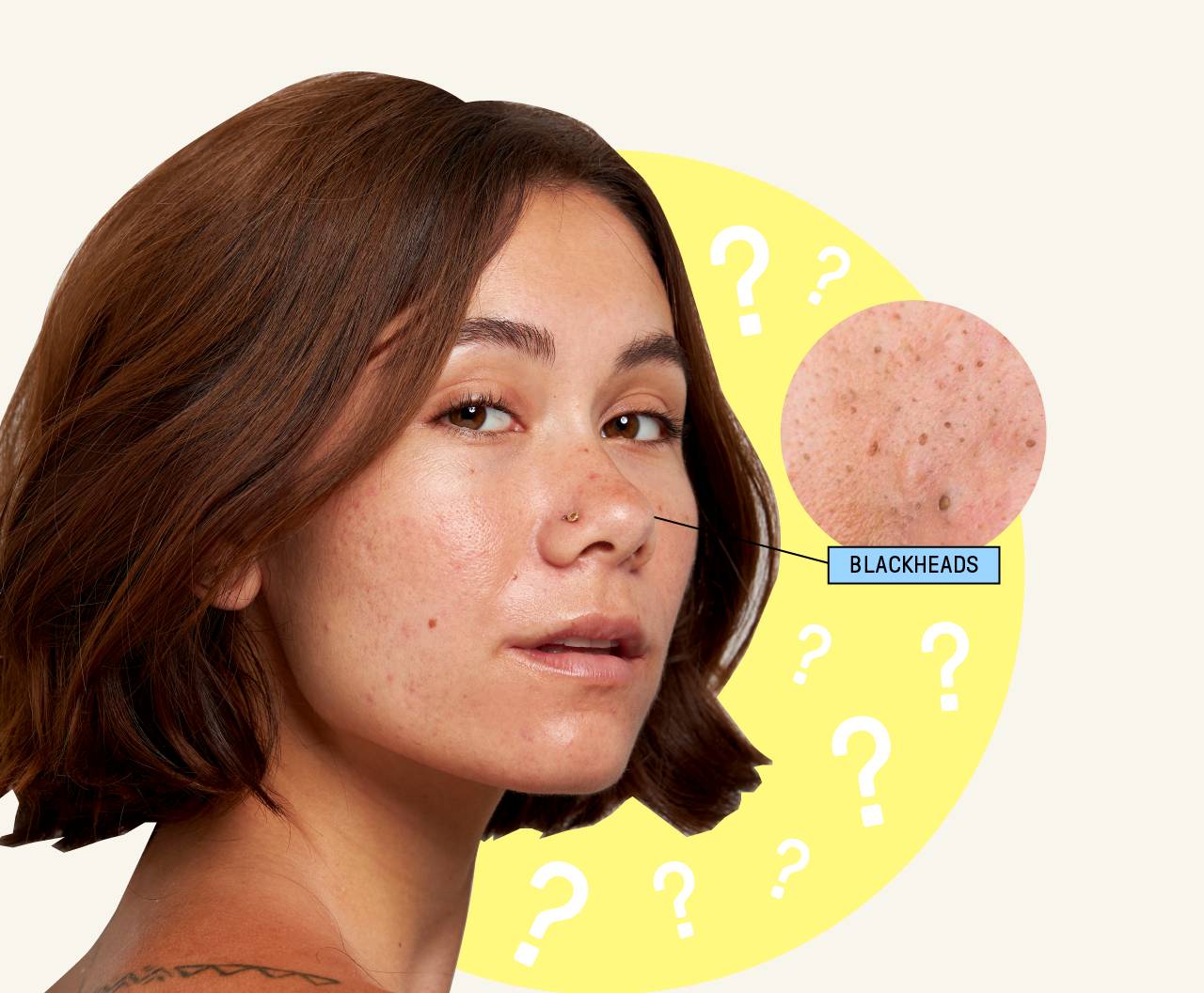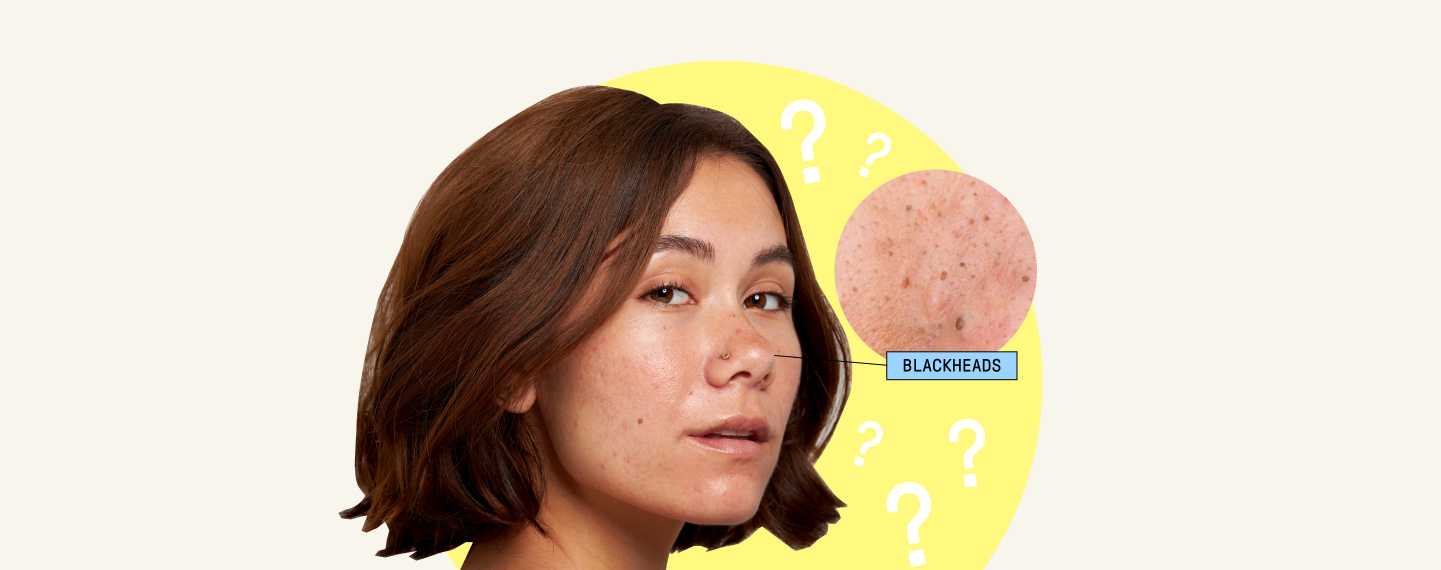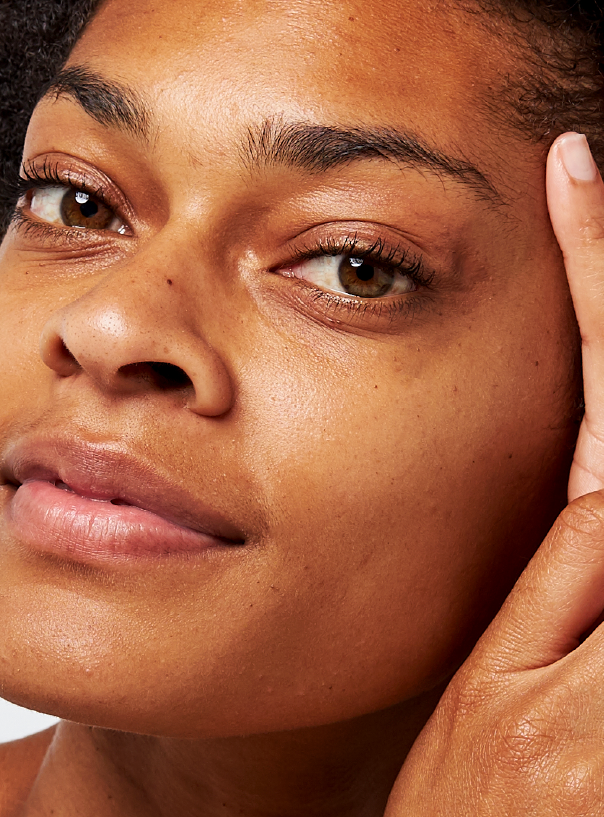Education
How to get rid of blackheads: 8 best treatments & tips


SHARE
Education
How to get rid of blackheads: 8 best treatments & tips
Medically reviewed by Kristin Hall, FNP
Written by Apostrophe Team
Last updated 11/3/2024
You scrub, exfoliate, and even squeeze your blackheads, but there seems to be a never-ending supply. The little black dots that hide on your nose, your chin, and across your face may feel like a signal to the world shouting, “This face is dirty!” but that’s not the case.
Blackheads are a type of acne, and like all acne, several factors can contribute to their development. Also like other forms of acne, there are treatments you can incorporate into your regular skin care routine to clear them up.
What Are Blackheads?
Commonly called blackheads, those dark little spots are technically a type of comedonal acne. There are two types of comedones: open and closed. Closed comedones are whiteheads and open comedones are blackheads.
Despite the common misconception that they’re filled with dirt, blackheads are black because the contents of the pimple are exposed to the air. The contents clogging your pores or hair follicles (oil and dead skin cells) interact with the air in a process called oxidation and turn black.
Like all other acne, the presence of blackheads can be attributed to a combination of factors, including oil or sebum production, the presence of bacteria (Propionibacterium acnes, now called Cutibacterium acnes), dead skin cells clogging your pores (follicular hyperkeratosis), and inflammation.
Comedonal vs. Inflammatory Acne
Acne can be bucketed into two categories: comedonal and inflammatory. Comedonal acne includes blackheads and whiteheads, whereas inflammatory acne is generally more severe and includes nodules, papules, and pustules.
In general, comedonal acne is more common overall, and inflammatory acne is more common among younger women. If your acne is only made up of comedones, and inflammatory pimples — think the big, red, painful ones — are rare, your acne is likely classified as mild to moderate.
A Note on General Hygiene
To reiterate: blackheads are not caused by dirt. You can’t scrub them away, and squeezing or picking at them can make them worse. They may look different than other pimples, but can be treated in much the same way.
Washing your face is important. Washing too little, washing too much or scrubbing could worsen your complexion. Exfoliation clears away dead skin cells that can clog your pores.
That said, it’s also worth noting that blackheads aren’t necessarily a sign of a “dirty” face. So keep your face clean, but don’t believe the negative hype that says having blackheads means your face is dirty and you don’t take care of it.
Blackhead Treatments That Work
Assuming you have blackheads and no additional inflammatory acne, treatment should be relatively easy. Your acne is mild. Reassuring, right? But this doesn’t mean you are safe from spending too much on ineffective over-the-counter solutions.
Topical retinoids are the go-to for mild to moderate acne like open comedones.

PRESCRIPTION TRETINOIN
Target acne, dark spots, and signs of aging with this science-backed ingredient.
And they can be used as a monotherapy, which means you don’t need additional products.
Even if your blackheads are mixed with inflammatory acne, and your acne is, therefore, more severe, a dermatology practitioner would likely prescribe a topical retinoid.
That’s because these medications work.
Topical retinoids including adapalene and tretinoin, for example, reduce inflammatory and non-inflammatory lesions with few side effects, according to scientific literature.
Other potential treatment options include over-the-counter benzoyl peroxide or a prescription antibiotic, if your acne also features inflammatory lesions. Finally, oral contraceptives have been shown to successfully treat acne in women. This could be a particularly effective choice if you find your breakouts are associated with certain times during your menstrual cycle.
Tips for Preventing Blackheads
In addition to washing your face twice daily and using a proven treatment like retinoids in your skin care routine, there are other steps you can take to keep blackheads and other blemishes at bay:
Manage your stress levels. Stress can worsen acne.
Don’t smoke. Tobacco smoking can increase acne risk.
Use only cosmetics that are “non-comedogenic” as they won’t contribute to clogging your pores, and clogged pores can lead to acne.
Talk to a healthcare provider or certified dermatology practitioner. You can spend your money on all the latest and greatest skin care trends online and in drug stores, but consulting with a pro will likely get you to an effective acne treatment much more quickly.
The Bottom Line on Getting Rid of Blackheads
Blackheads are a form of comedonal acne and are common in women of all ages.
Luckily, with the help of over-the-counter skin care products, medications, a proper skincare regimen, and, in some cases, the help of a certified dermatology practitioner, they’re also very treatable.
Living with blackheads, or really any type of acne blemish, can be stressful and even depressing. But we’re living in 2023, and there are proven solutions available to you.
References
https://blogs.scientificamerican.com/absolutely-maybe/blemish-the-truth-about-blackheads/
https://onlinelibrary.wiley.com/doi/abs/10.1111/j.1525-1470.2006.00276.x
Shop this post

Tretinoin
Like what you just read? Sign up for our email list to get the scoop on skincare science delivered straight to your inbox.

Deep Dives
A dermatologist shares his thoughts on the recent studies about benzoyl peroxide and benzene.
Read More
Education
What is milia?
What is milia? Today, we’re jumping into one type of bump that you may have heard about most commonly in infants — milia.
Read More
Education
Best moisturizer for acne-prone skin
If you have combination acne-prone skin, figuring out which moisturizer is best for your skin might be tough. In this guide, we break down the best moisturizer for combination, acne-prone skin.
Read More